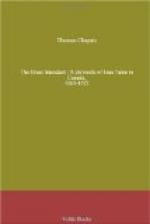to a gift of twenty livres, called ‘the king’s
gift.’ The same decree imposed a penalty
upon all fathers who had not married their sons at
twenty and their daughters at sixteen. In the
same spirit, it enacted also that all Canadians having
ten children living should be entitled to a pension
of three hundred livres annually; four hundred livres
was the reward for twelve. ’Marry early’
was the royal mandate. Colbert, writing to Talon
in 1668, says: ’I pray you to commend it
to the consideration of the whole people, that their
prosperity, their subsistence, and all that is dear
to them, depend on a general resolution, never to
be departed from, to marry youths at eighteen or nineteen
years and girls at fourteen or fifteen; since abundance
can never come to them except through the abundance
of men.’ And this was not enough; Colbert
went on: ’Those who may seem to have absolutely
renounced marriage should be made to bear additional
burdens, and be excluded from all honours; it would
be well even to add some mark of infamy.’
The unfortunate bachelor seems to have been treated
somewhat as a public malefactor. Talon issued
an order forbidding unmarried volontaires to hunt
with the Indians or go into the woods, if they did
not marry fifteen days after the arrival of the ships
from France. And a case is recorded of one Francois
Lenoir, of Montreal, who was brought before the judge
because, being unmarried, he had gone to trade with
the Indians. He pleaded guilty, and pledged himself
to marry next year after the arrival of the ships,
or failing that, to give one hundred and fifty livres
to the church of Montreal and a like sum to the hospital.
He kept his money and married within the term.
The matrimonial zeal of Colbert and Talon did not
slight the noblemen and officers. Captain de
la Mothe, marrying and taking up his abode in the
country, received sixteen hundred livres. During
the years 1665-68 six thousand livres were expended
to aid the marriage of young gentlewomen without means,
and six thousand to enable four captains, three lieutenants,
five ensigns, and a few minor officers to settle and
marry in the colony.
A word must be said as to the character of the young
women. Some writers have cast unfair aspersions
upon the girls sent out from France to marry in Canada.
After a serious study of the question, we are in a
position to state that these girls were most carefully
selected. Some of them were orphans reared in
charitable institutions under the king’s protection;
they were called les filles du roi. The rest
belonged to honest families, and their parents, overburdened
with children, were willing to send them to a new
country where they would be well provided for.
In 1670 Colbert wrote to the archbishop of Rouen:
’As in the parishes about Rouen fifty or sixty
girls might be found who would be very glad to go
to Canada to be married, I beg you to employ your
credit and authority with the cures of thirty or forty




